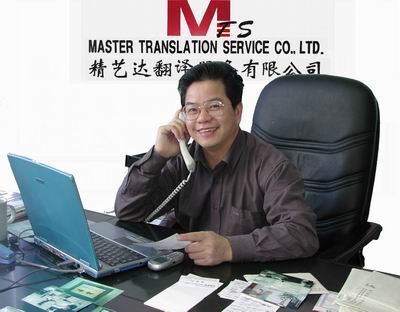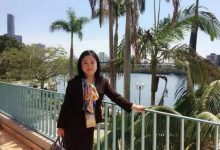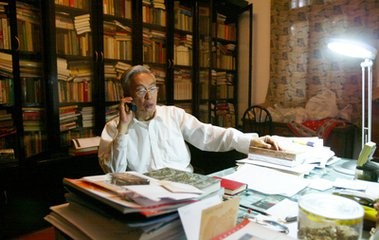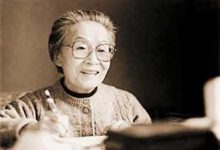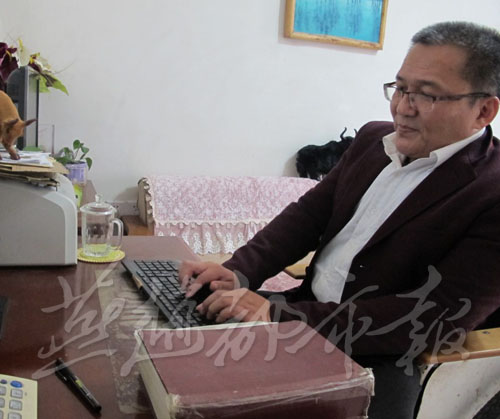摘自潘维廉(Bill Brown)的《魅力厦门》2007年 中文版第二十七章,P453-458页
与韦忠和一起踏水而行
韦忠和自童年时代起就踏水而行,但这在他的家乡屏南(位于宁德市境内)司空见惯。我曾亲眼看见几位屏南农民背负沉重的篮子安然穿越湖上。其中之奥秘并非太极或功夫(尽管屏南人因武术而闻名),而在于湖本身。
总面积40000平方米的白水洋湖位于一块平坦的巨石上,水深仅数英尺。浑然天成,是水上行走及水上运动和自行车赛的绝佳场所。有些人甚至驾车而过!而韦忠和不仅仅在屏南踏水而行,从厦门到北京到纽约,在其他任何地方他依然如此。
韦忠和出生于一个贫困的农民家庭。他的父母和祖父母都是农民。他的四个兄弟姐妹似乎注定要追随先辈的足迹——在耕犁后度过一生。他的两位姐姐没有上学,他的哥哥,仅读完初中,就开始工作以帮助韦忠和和他的弟弟完成学业。尽管如此,韦忠和还必须帮忙做农活。韦忠和说:“我努力学习,但我也努力工作。我要种田、割草放牛,中学时暑假和寒假都和大人一起刨地犁田。”
这种令人筋疲力尽的学习和生活作息可能会让许多人精神崩溃。但对韦忠和而言,这是一场严峻的考验,他借此磨练出了强健的身体和坚定的意志。1984年,这个农民的儿子高考成绩在整个宁德地区名列前茅,高分考进了厦门大学外语系英语专业。韦忠和离开家乡山区后依然行走于水上,但他很快就发现,真实的生活和白水洋的湖面很像——也许表面波澜不兴,但水下却暗滩潜伏,而涉水者应当学会如何涉水而行。
韦忠和于1984年进入厦门大学(XMU)外语系英语专业就读,很快就成为班上的顶尖学生。在来自英国、澳大利亚和美国的外教老师的指导下,他不断进步,并于1988年考上厦大“比较文学研究”研究生专业,师从陈敦全、林疑今(蜚声国际的作家林语堂之侄)及杨仁敬等教授。他的毕业论文是《中国唐代诗歌与英国意象派诗歌的比较研究》。
研究生二年级时,韦忠和在香港中文大学的博士入学考试中取得了优异的成绩,获得了比较文学研究的奖学金,但由于接下来1989年夏天的学潮,他无法取得护照。在向厦门大学校长王洛林最后求助失败后,韦忠和放弃了。韦忠和对失去这样的绝好机会感到很痛苦,正如他所说:“我丧失了对比较文学研究的所有兴趣!”
韦忠和继续他的学业,但心不在此。他也放弃了执教的梦想。另外他做着两份兼职工作——分别是一家中美合资企业代表处和一家贸易公司。毕业后,他开始寻求新的发展方向,贸易在1991年是热门,而且厦门信达(XINDECO)是厦门的四大公司之一,于是他成为一名外销员并迅速再次行走于水上。
韦忠和在业务方面与学业方面一样出众,一年后,他成为信达董事长高晓的秘书,高晓是一位博学的企业家,曾执教于北京外交学院,并曾在中国外交部工作20多年。“从他那里,我学会了很多管理和书写商务文件方面的知识”,韦忠和说,“他是一位学识渊博的企业家、学者和外交官。”
做总裁秘书两年之后,韦忠和被派往纽约和波士顿帮助启动信达在美国的业务。1994-1995年,信达从美国的GTE购买了厂房和一条高科技研究和生产设备,试产新式的薄膜显示器。该项投资失败,但当韦忠和开展这项业务时他接触到了被称为Internet(互联网)的新事物,他的人生再一次发生了意外的转变。
韦忠和在波士顿大学租了一间公寓并经常与来自美国和中国的学生聚会。当他了解所有能够了解到的关于互联网的信息后,他也处理了翻译问题。“那是我第一次做技术翻译,而且很难,”韦忠和说,“但我对互联网特别感兴趣。”
韦忠和返回厦门帮助组建信达商情有限公司,福建的第一家互联网公司(当时只有在北京和上海有几家)。1995–1996年,韦忠和组织举办了很多讲座,极力推动大众对互联网的兴趣。他的听众中有学生、商人和政府的领导人,如原厦门市市委书记石兆彬和市长洪永世。他的讲座对厦门政府当时发展Internet和利用网络宣传推广厦门的政策有着重大的影响。
韦忠和领导信达商情时聘请了德克萨斯大学的网络专家Kenneth Farrell 帮助设计中国的指南网站(Chinavista.com)——中国最早的网站之一,但在当时厦门没有互联网接入资源。唯一的上网途径就是通过拨号,从上海或美国接入。尽管如此,互联网在中国的使用迅速增加。
韦忠和将大量旅游、商务和政府文献翻译成英文,放到Chinavista.com上,这引起了国内和国外人士的极大兴趣。Chinavista.com当时没有给公司带来直接的盈利,但是它却促进了厦门信达在1997年成功上市。上市后的厦门信达资金充裕,但不愿给予Chinavista.com更多投资,而是将资金重点转向房地产。失望之极的韦忠和转身而去,但这次他没能悠然的踏水而行,而是“沉没“了。
“离开China Vista到厦门国际信托投资公司(XITIC)实业集团工作是个错误的决定!“韦忠和说,”我本该更耐心些,在坚持一下。说服信达给我们更多的支持,因为该网站具有巨大的潜力。我们比Sina.com或China.com还更早,而且如果我没有辞去China Vista的职务,它会比现在更好。”
从1997年到2000年,韦忠和在国内企业厦门厦信实业集团工作三年多,但所有的收获很有限。公司于2000年破产。作为公司副总裁,韦忠和是最后离开公司的人之一。2000年,曾一帆风顺的他却遭遇“失业”、迷失和沮丧。韦忠和以一种恰如其分的保守方式这样说道:“这是我职业生涯中最糟糕的一段时期,我感到非常的消沉!”
更为糟糕的是,2000年全球范围内网络公司的成功就像在他的伤口上又撒了一把盐。“2000—2002年众多网络公司上市”,韦忠和说“这让我感到更加沮丧!”
房地产行业的一位朋友请韦忠和帮忙,于是他试了几个月,但不喜欢那份工作,最后辞别。几个月后,他发现了专业翻译服务这一刚刚在中国兴起的新兴行业。韦忠和得知在北京和上海的几家公司成绩斐然,于是在2000年8月,他创办了福建省第一家专业翻译公司——厦门精艺达翻译服务有限公司(MTS)。“开始是我一个人创立”,韦忠和说“但是我需要合作伙伴,所以邀请大学同学Stanley加盟。”
韦忠和的第一份订单来自中国国际投资贸易洽谈会(IFIT)的林清景(现在是Amoy Paintings International的创办人及总裁)。随即又与Kodak、G.E.和其他主要跨国公司签订了合同,他还运用自己在网络方面的知识创建了精艺达网站,通过网络他同时吸引了客户和译员。
“互联网为我提供了一个全球化的平台,满足全厦门乃至福建的翻译需求”,韦忠和说,“我们翻译西班牙语、葡萄牙语、阿拉伯语、英语、法语、俄语、日语……我们继续帮助中国国际投资贸易洽谈会和本地企业向全球拓展,同时帮助外国公司入驻厦门及中国其它地区。”
精艺达取得成功的唯一重要原因是质量控制。韦忠和说:每个任务和项目,无论大小,不管是一张身份证还是几百张的技术手册,都至少经过5步质量流程:
(1) 负责订单的项目经理进行项目分析;
(2) 安排有相关专业背景的资深译员进行初译;
(3) 公司内部专职校对/编辑人员检查并给出意见;
(4) 将修订稿和修订意见返回原翻译定稿;
(5) 项目经理检查并确认最终交稿。
“这五个步骤是最基本的,”韦忠和说:“像软件本地化或网站全球化这样的项目,质量控制的措施更为严格和复杂。”
MTS对质量的重视获得了回报——特别是自从中国开始提出执行严格的翻译标准以来。厦门市政府部门或企业机构重要文件的翻译,不管是中国国际投资洽谈会手册亦或是重要国际交流活动中市长的讲话,精艺达都是首选的服务机构。
精艺达的业务以每年50%的速度递增。韦忠和期望在两到三年内实现年营业额1000万元的目标,但他并不满足于此。韦忠和说,“六年的经营后我们的年销售额仍然没达到500万元人民币,与其他行业相比这的确相对较少。厦门市场占我们国内市场份额的90%,但厦门是一个小市场。现在我们40%的业务来自于海外,而且我们在上海成立了分公司,这是我们扩张战略的关键所在。”他笑着补充道:“但有了互联网,整个世界都是我们的市场!”
看来韦忠和不再仅仅满足于踏水行走,他正期待着展翅高飞!
潘维廉先生的英文原版:
Frank Wei has walked on water since childhood but that’s not uncommon in his hometown of Pingnan (Ningde). I have seen several Pingnan peasants bearing heavy baskets walk completely across a lake. The secret is not in Taiqi or Kung Fu (though Pingnan folk are famous for their martial arts) but in the lake itself.
The entire 40,000m2 Baishuiyang Lake lies only a few inches above a massive flat rock, making it the perfect venue not only for walking on water but also watertop sports events and bike races. Some folks even drive their cars across the lake! But Frank Wei has walked on water not just in Pingnan but everywhere else as well, from Xiamen to Běijīng to New York.
Frank was born into a poor peasant family. His parents and grandparents were peasants, and he and his 4 brothers and sisters seemed destined to follow in their footsteps—behind the plow. His two sisters did not attend school, but his older brother, who finished only primary school, worked to help Frank and his younger brother finish school. Even so, Frank had to take his turns in the fields as well. Frank said, ‘I studied hard, but I also worked hard. I had to plant rice, and tend animals, and in middle school I spent my summer and winter holidays with the adults digging and plowing.”
This grueling schedule of school and labor might have broken many people but for Frank it was a crucible from which he emerged strong of both body and mind. In 1984, this farmer’s boy was the top student in all of Ningde Prefecture, and earned one of the highest college entrance scores for the entire province of Fújiàn. Frank was walking on water as he left his mountainous home, but as he soon discovered, real life was much like Baishuiyang Lake—smooth on the surface, perhaps, but with treacherous pits just beneath, and the water walker was about to learn how to tread water.
Frank entered Xiamen Univeristy’s (XMU) Foreign Language Department in 1984 as an English major and quickly rose to the top of his class. He thrived under the tutelage of foreign teachers from England, Australia and the U.S.A., and in 1988 he began an XMU graduate program in Comparative Literature Studies, where he studied under such professors as Chen Dunquan, Lin Yi Jin ( the niece of the internationally acclaimed writer Lin Yutang), and Yang Renjing. His thesis was a comparative study of images and poetry between England and Tang Dynasty China.
During Frank’s second year of graduate studies he did so well on the entrance exam for a Hong Kong Chinese University doctorate program that he was offered a scholarship in comparative literature studies, but because of the turmoil following the summer of 1989, he was unable to get a passport from Xiamen University. After a futile appeal to XMU’s president, Wang Luolin, Frank threw in the towel. Frank was bitter about losing such an excellent opportunity and, as he said, “I lost all interest in comparative studies!”
Frank continued his studies but his heart wasn’t in it, and he abandoned his dream of a teaching career. He took two part-time jobs on the side—one in a Sino-U.S. representative office and another in a foreign trade company. After graduation he sought a new direction. Trade was hot in 1991, and XINDECO (厦门信达 ) was the #4 firm in Xiamen, so he became a sales person in foreign trade and in short order was once again walking on water.
Frank excelled in business as he had in academics, and after a year he became assistant to XINDECO President Gao Xiao, a well-learned entrepreneur who had taught at Běijīng Foreign Relations University and had worked in China’s Foreign Ministry for over 20 years. “I learned much from him about management and writing business documents,” Frank said. “He was a well learned entrepreneur, a scholar and a diplomat.”
After two years as the president’s assistant Frank was sent to New York and Boston to help start XINDECO’s trading in the U.S. XINDECO bought a hi-tech facility from GTE in Boston to test a new thin-film display between 1994-1995. The venture failed, but while Frank was pursuing this deal he heard about a new idea called the internet, and once again his life took an unexpected turn.
Frank rented an apartment on Boston College and met often with students from the U.S. and China. While he learned all he could about the internet, he also tackled translation. “That was the first time I had done technical translation, and it was very difficult,” Frank said. “But I was most interested in the internet.”
Frank returned to Xiamen to help start XINDECO Business Information, Ltd, the first internet company in Fújiàn (at the time there were only a few others, in Běijīng and Shànghǎi). Between 1995-96 Frank lectured widely to promote interest in the internet. His audience ranged from students and businessmen to government leaders like Xiamen Party Secretary Shi Zhaobing and Mayor Hong Yongshi. His lectures exerted great influence on Xiamen government policy at the time.
While Frank headed XINDECO Business he hired Kenneth Farrell from the University of Texas to help design Chinavista.com, one of China’s first websites, but at the time Xiamen had no internet access. The only way to go online was to dial Shanghai or the U.S. Even so, internet use grew rapidly.
Frank translated numerous travel, business and government literature into English to post on Chinavista.com, which attracted great interest from both Chinese and foreigners, but Chinavista.com did not make a profit. Meanwhile, XINDECO went public in 1997, but though the firm had benefited greatly from its internet venture, the cash-flush company refused to invest in Chinavista.com, plowings its assets into real estate instead. A very frustrated Frank jumped ship—but instead of walking on water he sank.
“It was a bad decision to leave China Vista to work for XITIC (Xiamen International Trust and Investment Corporation) Industrial Group!” Frank said. “I should have been more patient and persistent, and persuaded XINDICO to support us, because it had great potential. We were earlier than Sina.com or China.com, and had I not quit China Vista would be better than them today.”
Frank went to work with the State-owned XITIC Industrial Group for over three years, from mid 1997 until 2000, but the firm offered little opportunity or incentive, and in 2000 went bankrupt. Frank, a Vice President, was one of the last to leave, but by mid 2000 the man who had walked on water was now jobless, directionless, and depressed. With classic understatement Frank said, “It was a bad time in my career…. I was quite depressed. Again!”
Worse yet, the success of internet companies in 2000 rubbed salt in his wounds. “So many internet companies went public between 2000 and 2002,” Frank said. “That made me even more depressed!”
A friend in the real estate business asked Frank for help so he tried it for a few months, but didn’t like it, and quit. But a few months later he found his niche in the professional translation industry, which was just catching on in China. Frank learned that a few firms in Shànghǎi and Běijīng were doing well, so in August, 2000, he started Fújiàn Province’s first professional translation firm, Master Translation Services. “I started it by myself,” Frank said, “but I needed a team, so I invited my college classmate Stanley to join.”
Frank’s first commission was from CIFIT’s Donald Linn (who is now founder and president of Amoy Paintings International). He then landed contracts with Kodak, G.E. and other major global firms, and he used his internet expertise to help build the MTS Website, through which he attracts both clients and translators.
“The internet gives me a global platform to meet translating needs all over Xiamen and Fújiàn,” Frank said. “We translate into Spanish, Portuguese, Arabic, English, French, Russian, Japanese… We continue to help CIFIT and local businesses to expand globally, and also help foreign firms to enter Xiamen and the rest of China.”
The single most important key to MTS’s success is quality control. Frank said, “Every job and project, large or small, whether it is an ID Card or a 100 page technical manual, undergoes the same 5-step quality process:
1) A project analysis by a Project Manager assigned to the case.
2) 1st Translation Draft is performed.
3) Proof Reader/Editor reviews and makes comments.
4) Translation is reviewed with the original translator.
5) The Project Manager reviews and approves the final product.
“Those five steps are the minimum,” Frank said. “For projects like software, or website globalization, quality control measures are even more complicated.”
MTS’ attention to quality is reaping a reward—especially since Běijīng began its drive to address the generally abysmal quality of translation in China. Nowadays, few government or business officials in Xiamen would entrust the translation of crucial documents, be they a CIFIT brochure or a Mayor’s speech, to any firm but MTS.
MTS’ business is growing 50% annually and Frank expects to reach 10 million in annual business within 2 to 3 years, but he isn’t satisfied. Frank said, “After six years our sales volume is still less than 5 million RMB annually. Compared with other industries that is relatively small. Xiamen accounts for 90% of our domestic market, but Xiamen is a small market. Now 40% of our business is from overseas, and we’re setting up a branch in Shànghǎi, which is key to our expansion strategy.” He smiled and added, “But with the internet, the whole world is our market!”
It seems Frank is no longer content to just walk on water; he intends to fly as well!

